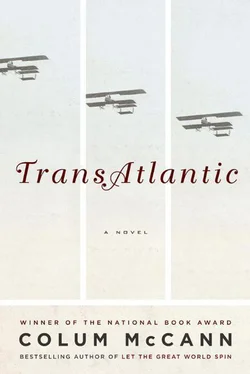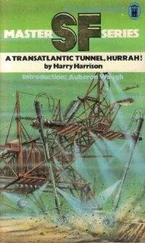Brown sits back and waits for the weather to clear so he can guide the plane properly. He looks for a glint of sun on the wingtip, or a breakout into blue, so he can find a horizon line, make a quick calculation, shoot the sun for longitude.
The aircraft swings from side to side, fishtailing in the turbulence. The sudden loss of height. It feels as if their seats are falling away from them. They rise once more. The ceaseless noise. The bump. The heart skip.
Light fading, they come upon another gap in the upper layer of clouds. The sun falling red. Down below, Brown gets a brief glimpse of sea. A split-second curve of beauty. He grabs the spirit level from the floor. Tilts it, straightens. A quick calculation. We’re at 140 knots approx, on general course, a bit too far south and east .
Twenty minutes later they come upon another huge bank of cloud. They rise to a gap between layers. We will not get above the clouds for sunset. We should wait for dark and stars. Can you get above at, say, 60 deg? Alcock nods, banks the plane, curls it slowly through space. Red fire spits through the fog.
They both know the games the mind can play if caught in cloud. A man can think a plane is level in the air, even if laid on its side. The machine can be tilted towards doom and they might fly blithely along, or they could crash into the water, no warning. They must keep a lookout for any sight of moon or star or horizon line.
So much for the bloody forecast , scribbles Brown, and he can tell from Alcock’s response, in the gentle pull-back of the engine, the slight caution in the movement, that he is worried, too. They pull their collars up into the wet slap of weather. Beads of moisture slide upwards along the open windscreen. The battery in the seat between them still sends faint pulses of warmth through the wires in their suits, but the cold is shrill around them.
Brown kneels on his seat, leans over the edge to see if he can find any gap, but there is none.
No range of vision. 6500 feet. Flying entirely by dead reckoning. We must get through the upper range of cloud. Heating fading fast, too!
THE BONES IN their ears ring. The racket is stuck inside their skulls. The small white room of their minds. The blast of noise from one wall to the other. There are times Brown feels that the engines are trying to burst out from behind his eyes, some metal thing grown feral, impossible now to lose.
THE RAIN COMES first. Then the snow. A prospect of sleet. The cockpit has been designed to keep most of the weather at bay, but hail could rip the cloth wings asunder.
They lift into softer snow. No light. No relief. They hunker down as the storm thuds around them. More snow. Harder now. They drop once more. The flakes sting their cheeks and melt along their throats. Soon the white begins to drift around their feet. If they could rise above and look down, they would see a small open room of two helmeted figures pelting through the air. Stranger than that, even. A moving room, in the darkness, in a screech of wind, two men, the top of their torsos growing whiter and whiter.
When Brown shines his flashlight at the control behind his head he sees that a layer of snow has started to obscure the face of the petrol-overflow gauge. Not good. They need the gauge to guard against trouble with the carburetor. He has done this before, turned in the cockpit, reached dangerously high above his head, but never in weather like this. Still, it has to be done. Nine thousand feet above the ocean. What form of madness is this?
He glances at Alcock as they ride a small bump of turbulence. Just keep her level. No use telling him now. Can’t swim, old boy. Would hardly bring a smile to his lips.
Brown adjusts his gloves, pulls his earflaps tight, hikes his scarf high around his mouth. He swivels in his seat. A throb in his bad leg when he moves. Right knee against the edge of the fuselage. Then the left knee, the bad one. He grabs hold of the wooden strut and pulls himself up into the blast of air. The chloroform of cold. The air pushing him back. The sting of snow on his cheeks. His soaking clothes stuck to his neck, his back, his shoulders. A chandelier of snot from his nose. The blood backing off his body, his fingers, his brain. Abandoning the five senses. Careful now. He extends himself into the thrashing wind, but can’t quite reach. His flight jacket is too bulky. He loosens the zip, feels the whoosh of wind at his chest, stretches backwards, knocks the snow off the glass gauge with the tip of his knife.
Good God. This cold. Almost stops the heart.
He hunkers quickly back in the seat. A thumbs-up from Alcock. Brown reaches immediately for the battery wires to warm himself up. He doesn’t even need to write the note to Alcock: Heating is entirely dead . On the floor, at his feet, lie the maps. He stamps his feet, careful not to sully the charts. The tips of his fingers sting. His teeth chatter so much he thinks they might break.
Over his left shoulder, in the small wooden cupboard, is the flask of tea and the emergency brandy.
IT TAKES AN age to get the lid off the flask, but then the liquor stuns the wall of his chest.
THEY REMAIN IN the hotel room, the table still positioned at the window in case the plane returns. Mother and daughter together, watching, waiting. There has been no news. No radio contact. No stirrings at the makeshift aerodrome. The field has been silent for twelve hours.
Lottie finds herself gripping the window frame. What might have happened? It was, she thinks, a bad idea for her mother to have written to the family in Cork. To have distracted them, maybe. She feels complicit now. Brown didn’t need another thing to worry about, no matter how small, why stop him on the stairs, why give him the letter? What was the point of it anyway? Perhaps they fell. They must have fallen. They have fallen. I gave him a letter. He was distracted. They fell. She can hear them falling. The whistle through the struts of the plane.
She puts her fingers against the cold of the windowpane. She doesn’t like herself at moments like this, her strange bearing, her shrill self-consciousness, her youth. She wishes she could walk outside of herself, out the window, into the air, and down. Ah, then, but that’s it, maybe? That, then, is the point of it all, surely? Yes. A salute to you Mr. Brown, Mr. Alcock, wherever you might be. She wishes she could take a photograph of the moment. Eureka. The point of flight. To get rid of oneself. That was reason enough to fly.
DOWN BELOW, IN the lobby, the other reporters crowd around the telegraph machine. One by one they link back to their editors. Nothing to report. Fifteen hours gone. Either Alcock and Brown are approaching Ireland now, or they are dead and gone, casualties of desire. The reporters begin the first paragraphs, writing in both styles, the elegiac, the celebratory— Today, a great joining of worlds — Today, a great mourning of heroes —keen to be the first to finger the pulse, keener still to be the first to get a hold of the telegraph when any real news comes through.
IT IS CLOSE to sunrise — not far from Ireland — when they hit a cloud they can’t escape. No line of sight. No horizon. A fierce gray. Almost four thousand feet above the Atlantic. Darkness still, no moon, no sight of sea. They descend. The snow has relented but they enter a huge bank of white. Look at this one, Jackie. Look at her coming. Immense. Unavoidable. Above and below.
They are swallowed.
Alcock taps the glass of the airspeed meter. It doesn’t budge. He adjusts the throttle and the front end of the plane lifts. Still the airspeed meter remains the same. He throttles again. Too sudden, that. Darn it.
Good God, Jackie, put her in a spin. We’ll take our chances now.
Читать дальше












